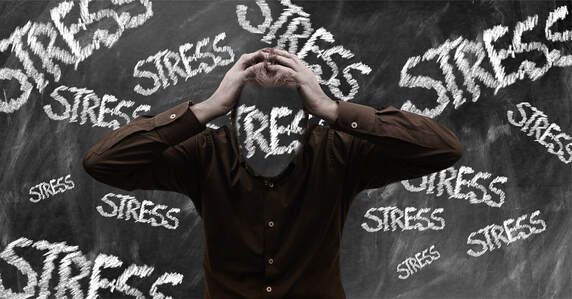|
Stress is something everyone experiences and it’s a normal part of life. You can experience good stress called eustress when you’re starting a new job, buying a home, or getting married. Despite some challenges that can occur during these events, this type of stress is typically short-term and has no long-term effects on your health. In fact, eustress energizes us creating motivation, excitement, and the capability to overcome obstacles and make positive life changes. On the flipside, bad stress caused by situations such as illness, financial troubles, work pressure, or strained relationships can leave someone feeling overwhelmed, anxious, and helpless. This type of stress is called distress. Stress and the Body Whether you experience eustress or distress, your body responds the same way. There’s an automatic physiological reaction between your brain and the nervous system. The brain detects danger which activates your sympathetic nervous system causing a “fight or flight” response to protect your body in an emergency and prepares you to respond quickly. During this response your body releases cortisol, norepinephrine, and adrenaline hormones. You may experience your heart pounding faster, muscles tightening, and breathing faster. When the perceived danger is gone, your nervous system should revert back to normal. However, if your body is constantly experiencing stress due to hardships, everyday family or work pressure, or the need to constantly perform at a high levels academically or athletically, this can lead to chronic stress that can have a negative impact on your physical health, mental health, and behavior. Prolonged physical symptoms of stress include:
Mental symptoms include:
Behavior changes include:
Untreated chronic stress can lead to serious health conditions like heart disease, high blood pressure, or suppress your immune functions. MOVE Your Stress Away We can’t stop stress from coming into our lives, but we can practice stress management to help cope with stress. After a stressful day or event, most likely the last thing on your mind is movement. You may think sitting in front of your TV, grabbing a glass of wine, or scrolling through Instagram sounds like a great way to de-stress, but in fact lack of physical movement can make you feel worse and increases the likelihood of engaging or learning unhealthy habits to cope with stress. There are many stress reducing techniques you can take part in such as meditation, breathing exercises, or journaling. Partaking in both mental and physical stress reduction techniques is equally important, but today we’re going to focus on movement. Feeling unmotivated, tired, or anxious are all good reasons to increase your physical activity. 1. Exercise Exercise releases endorphins, your brain’s feel-good neurotransmitters, and decreases your body’s stress hormones. The CDC recommends adult’s ages 18-64 years engage in 150 minutes of moderate-intensity physical activity and 2 days of muscle strengthening activity. This is equal to 30 minutes of exercise, 5 days per week. Aerobic exercises such as running, swimming, tennis, or hiking are known to be most effective at releasing endorphins. Make exercise a social activity. Being outside or exercising with your friends provides even more benefits. Goat yoga anyone? 2. Physical Activity Not ready to join the gym or commit to an exercise routine. Begin increasing your physical activity at home.
3. Fascial Stretch Therapy If thinking about increasing physical activity or movement increases your stress levels, have someone help you and experience a Fascial Stretch Therapy (FST) session. FST is a pain-free, assisted stretch that focuses on the connective tissue called fascia, which surrounds your organs, muscles, and nerves. Sessions are focused on a whole body approach instead of isolating specific muscles. FST is known to “romance” the parasympathetic nervous system, which makes it a great stress management option. The parasympathetic nervous system’s responsibility is to relax your body’s activities and conserve energy for another time. Not only does FST help relax the body, but other benefits include better flexibility, reduced pain, increased circulation, and improved energy. 10 – Minute Rule Stress is known to decrease motivation and that can make beginning any activity overwhelming. Start out small using the 10-Minute Rule. Set a timer or your watch for 10 minutes and simply begin moving around or engage in a physical activity (preferably a preferred activity). At the 10 minute mark, decide if you’d like to continue the activity or stop. Usually once you start moving, motivation shows up for you to continue. If it doesn’t, give yourself permission to stop and congratulate yourself for completing 10 minutes of movement. Seeking Professional Help Prioritizing stress management can improve your overall health and quality of life, however, there’s no one-size-fits all method to managing stress. Managing stress can be complex depending on what’s causing your stress. If you’re feeling overwhelmed, using drugs or alcohol to cope, or your physical symptoms worsen, reach out to a health care professional like your doctor, or a therapist for tailored advice and individualized treatment options.
0 Comments
Leave a Reply. |
Archives
October 2023
Categories |
Office Hours
|
Telephone:Call or text:
480-823-1877 |
Email: |

